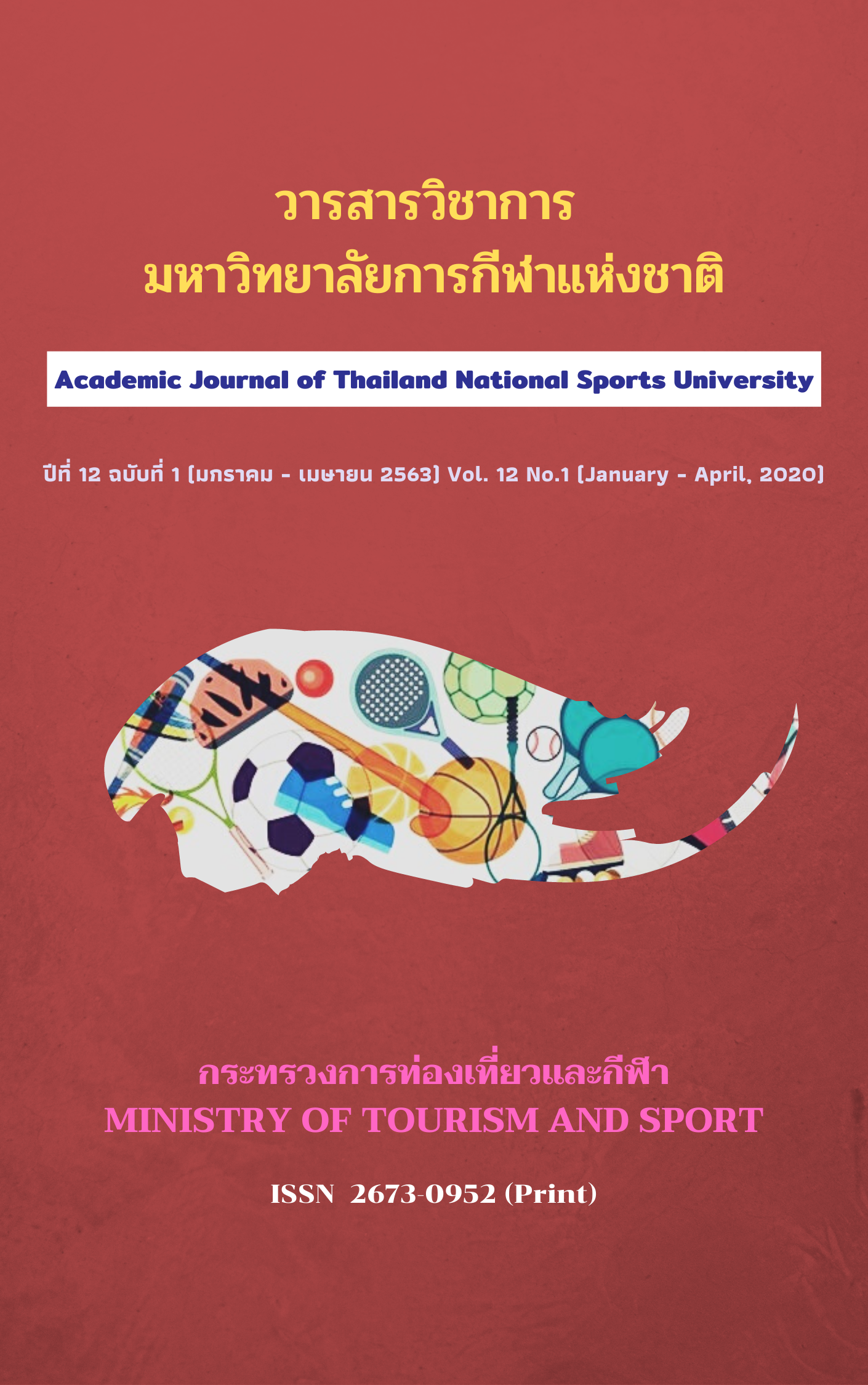THE POTENTIAL OF MUAYTHAI CAMPS TO SUPPORT TOURISM FOR FOREIGN TOURISTS
Main Article Content
Abstract
The purposes of this research were 1) to study the potential of Muaythai camps on using Muaythai to promote tourism for foreign tourists who had trained Muaythai in Thailand, 2) to study the obstacles of Muaythai camps to support foreign tourists. The samples used in this research were 449 foreign tourists who had trained Muaythai in 6 regions of Thailand and 20 people of Muaythai camp managers. The instruments used were questionnaire and Semi - Instructor interview questions with Pearson‘s product moment correlation coefficients test at .91. The results were found as follows: The quantitative results were found that the overall potential of Muaythai camps on using Muaythai to promote tourism for foreign tourists who had trained Muaythai in Thailand was at a high level ( =4.18). As each aspect, it was found that value, reputation and attraction were at a high level (
=4.28), marketing (
=4.21), accessibility (
=4.17). Statistical significant difference was found when comparing in each region at the level .05. Muaythai camp in Bangkok was different from the Central region, North Eastern region and Eastern region at the statistical significant level of .05. Eastern region was different from North Eastern region at the statistical significant level of .05. The qualitative results were found that Muaythai products convinced foreign tourists to come to train Muaythai. There were many supplies for supporting foreign tourists who wanted to train Muaythai. Muaythai camps had various strategies for managing and supporting Muaythai camp business. Moreover, lack of coordination with government organization was found to promote Muaythai for Thailand tourism. The obstacles of Muaythai camps for foreign tourists were 1) Visa permission, 2) short time training by a trainer, 3) limited space and 4) loud noise interrupting the neighborhood.
Article Details
The published article is a copyright of the Academic Journal of Thailand National Sports University. The passage appeared in each article in this academic journal is a perspective of each author which is not related to the journal. Each author is required to be responsible for all components of his/her own article. If there are any mistakes, each author must be responsible for those mistakes on his/her own.
References
Abolfazl, A., Namin, T. & Niknam, K. (2012). Sports tourism and new opportunities in developing countries: A case study of sport tourism in the province of Ardebil. Management Science Letters, 2(2012), 895–902.
Chanchai Yomdit, Baramee Choochai, Rungnapa Singsatit, Nattakon Sukserm, and Kawitapaht Mongkamnum. (2017). Subproject one Thailand’s Tourism Strategy in using Muaythai to Promote Tourism among Foreign Tourist. Ratchaburi: Muban Chombueng Rajabhat University.
Dittachai Chankuna. (2018). Confirmatory factor analysis of effective fitness centers in Bangkok Metropolitan Region. Journal of Academic Journal Institute of Physical Education, 10(1), 65-76.
Gammon, S. & Robinson, T. (2003). Sport and tourism: A conceptual framework. Journal of Sport & Tourism, 8(1), 21-26.
Kingkanok Saowapawong, Rattana Panriansaen, and Sombat Kamjanakit. (2018). A Development model of Thailand to become the health tourism centre of Asia. Journal Academic Institute of Physical Education, 10(1), 191- 200.
Komsit Kieanwatana, Suchitra Sukonthasab, and Wipavadee Leemingsawat. (2018). Situations, needs and trends of health tourism model In Thailand. Journal Academic Institute of Physical Education, 10(1), 167-177.
Raja Syed Tengku Sulaiman, Wanna Pitaksan, and Kantinut Satiramanus. (2011). Full Research Reports Muay Thai: A Green Season Commercial Innovation on the Andaman Area. Bangkok: The Thailand Research Fund.
Royal Academy. (2013). Royal Institute Dictionary, Thursday 5 February 2011 in honor of His Majesty the King on the occasion of the auspicious ceremonies around December 5, 2011. Bangkok: Sirivatana Interprint.
Techita Chai-on. (2014). Expectations of foreign customers toward quality service of Muaythai camps. (Master’s thesis). Silpakorn University.
Thanh, L., Q. (2017). A study on the status of sport tourism development in Vietnam. Journal of Sports Science, 5(2017), 219-226.
Thanin Slinjaru. (2011). Research and Data Analysis Guide with SPSS. Nonthaburi: NIDA Printing.


